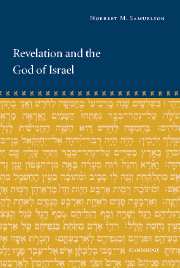Book contents
- Frontmatter
- Contents
- Acknowledgments
- Introduction
- PART I THE GOD OF REVELATION
- PART II IS THE GOD OF REVELATION BELIEVABLE?
- 5 The challenges of political ethics – issues of racism and the irrational
- 6 The challenges of modern science
- 7 The challenges of modern philosophy – rethinking God
- 8 Are the Hebrew Scriptures revealed?
- Conclusion
- Works cited
- Index of names
- Index of subjects
6 - The challenges of modern science
Published online by Cambridge University Press: 22 September 2009
- Frontmatter
- Contents
- Acknowledgments
- Introduction
- PART I THE GOD OF REVELATION
- PART II IS THE GOD OF REVELATION BELIEVABLE?
- 5 The challenges of political ethics – issues of racism and the irrational
- 6 The challenges of modern science
- 7 The challenges of modern philosophy – rethinking God
- 8 Are the Hebrew Scriptures revealed?
- Conclusion
- Works cited
- Index of names
- Index of subjects
Summary
REVIEW
This book began by positing that revelation is a critical foundational principle for a believable expression of all three Abrahamic faiths (Judaism, Christianity, and Islam). Furthermore, this belief must be compatible with the claim that the single deity who reveals himself also created the universe. Furthermore, in the case of any form of Jewish religion (traditional or liberal), it must be compatible with the claim that God revealed himself by means of Moses through the Torah. The first part of this book considered viable candidates for a conception of such a deity out of the sources of the Hebrew Scriptures themselves, and how Jewish philosophers and theologians have interpreted what those Scriptures say. In this case I focused on one major representative of classical rabbinic philosophy, the philosophy of Maimonides, and two major representatives of modern Jewish theology, the theologies of Martin Buber and Franz Rosenzweig.
ON THE EXCLUSION OF KABBALAH AND SPINOZA
It should be noted that I did not consider every possible conception of God that can be found in the tradition of Jewish thought. In particular I have not dealt with the tradition of Kabbalah in connection with classical Jewish religious thought, and I have not dealt with the more secular, humanistic tradition of Spinoza in connection with modern Jewish thought.
I will not discuss the philosophy of Spinoza in any detail in this book. I do acknowledge its importance.
- Type
- Chapter
- Information
- Revelation and the God of Israel , pp. 121 - 169Publisher: Cambridge University PressPrint publication year: 2002

